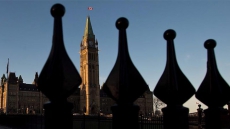HALIFAX — A private Christian university in British Columbia is hoping to persuade a judge to overturn a decision by the Nova Scotia Barristers' Society to deny accreditation to graduates of the university's proposed law school.
Four days have been set aside in the Supreme Court of Nova Scotia for the judicial review, which starts Tuesday.
In April, the barristers' society council decided it would not allow graduates from Trinity Western University's law school to enrol in the bar admission program unless the school dropped a requirement that students sign a pledge to abstain from sex outside heterosexual marriage.
The pledge, described by the school as a community covenant, has been criticized as discriminatory against gays and lesbians.
The lawyers' society says its decision to deny accreditation would prevent graduates from Trinity Western from articling in Nova Scotia, but it wouldn't stop them from practising law in the province.
In a brief filed with the court, the society says it has not violated the rights of the law school's future graduates.
"While the charter does protect freedom of religion and association, it does not require the society to validate or support conduct that discriminates against others," it says.
The privately funded university, based in Langley with about 4,000 students, wants to open a law school in 2016.
Trinity Western president Bob Kuhn has said the Nova Scotia decision and a similar one delivered by Ontario's Law Society of Upper Canada represent a blow to religious freedom in Canada.
The university's court brief says the Nova Scotia Barristers' Society doesn't have jurisdiction over law schools or the actions of B.C. residents. The brief says the barristers' society is entitled to judge the qualifications of students, but their religious beliefs and who they associate with in law school are irrelevant.
It says the case is about balancing the right of religious freedom with the right to be free from unlawful discrimination.
"Allowing people in B.C. to voluntarily agree not to engage in sexual intimacy outside an opposite sex marriage does not limit the right of people in Nova Scotia who wish to engage in sexual intimacy on some other basis," its brief says.
Last December, the Federation of Law Societies of Canada gave Trinity Western preliminary approval for its law school program and said it was up to provincial law societies to decide whether to recognize degrees from the school.
Earlier this month, the British Columbia government revoked its support for the law school, saying the school can't enrol students in the program because of the "uncertainty" over approval by the B.C. Law Society. That decision followed an October vote by the B.C. Law Society not to recognize the university's law school graduates.
Advanced Education Minister Amrik Virk has said the university could reapply for government consent once the legal issues are resolved.
It's not the first time the university has fought to defend its beliefs.
In the late 1990s, the British Columbia College of Teachers blocked Trinity Western from granting teaching degrees in light of policies related to homosexuality. The case went to the Supreme Court of Canada, which overturned the college's decision in 2001.





